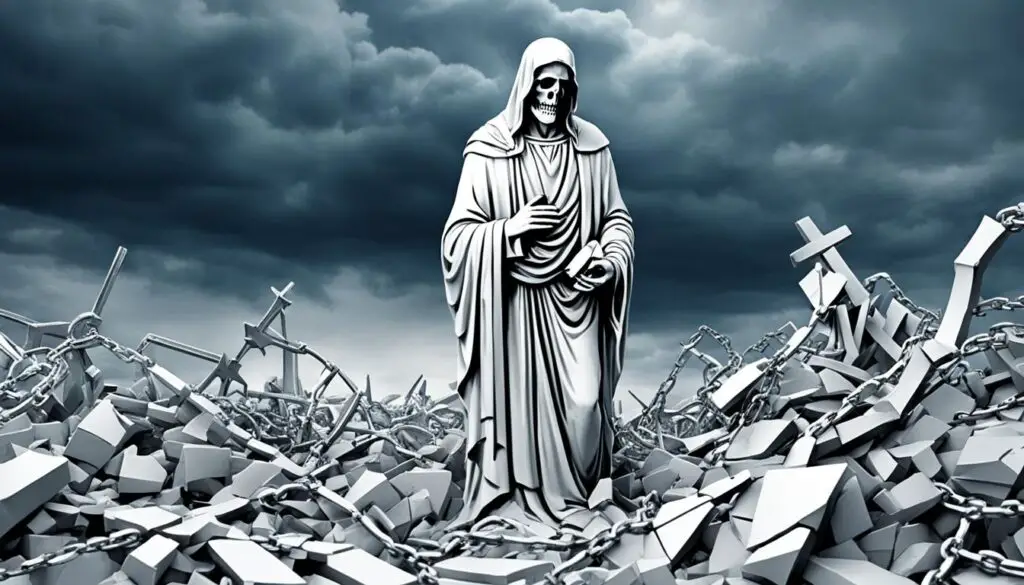In this article, I will explore the topic of nihilism and the death of God from a philosophical perspective, analyzing the reflections of Friedrich Nietzsche on crisis of values, lack of meaning and search for meaning in an ever-changing world. I will examine the influence of nihilism in society and how disbelief in metaphysics has impacted contemporary culture.
Main conclusions:
- O nihilism addresses the lack of meaning and crisis of values that arise with the death of God na existentialist philosophy.
- Friedrich Nietzsche was one of the main philosophers to explore the nihilism and its influence on society.
- A disbelief in metaphysics has generated a existential void and impacted contemporary culture.
- A search for meaning becomes crucial in a post-death of God.
- Reflect and discuss the nihilism and the death of God It is fundamental to understanding the human condition in today's society.
The Death of God in Nietzsche's Thought
In the philosophical thought of Friedrich Nietzsche, the idea of death of God plays a fundamental role. Nietzsche argues that Western civilization, over the centuries, gradually abandoned belief in God and, as a result, now faces the consequences of living in a world without the divine presence. For Nietzsche, the death of God is not only the rejection of the existence of a supreme being, but it also implies the suppression of morals and values that were previously based on religion.
According to Nietzsche, divine sunset is the result of self-suppression of morals by individuals. He believes that as humanity questions the validity of traditional values and religious dogmas, metaphysical morality collapses and self-suppression of morals becomes inevitable. Through this process of self-suppression, individuals recognize that the morality that was once considered objective and divinely prescribed is, in fact, a human construct. This perception undermines the belief in an absolute moral system, leading to nihilism.
"God is dead. And we killed him. How shall we console ourselves, murderers among murderers? The holiest and most powerful thing the world has ever possessed has bled beneath our cuts—who will cleanse us of this blood? With what water shall we purify ourselves?”
However, Nietzsche also points out that nihilism does not necessarily lead to despair and despair. existential void. Instead, he sees the divine sunset as an opportunity to achieve a new kind of freedom e self-determination. For Nietzsche, the death of God allows individuals to question and reevaluate established values, providing space for the development of a new morality and a new understanding of existence.

the question of atheism it is also fundamental in Nietzsche's thought. Although the death of God is associated with a negative nihilism, Nietzsche advocates a kind of atheism positive that embraces the death of God as an opportunity for the affirmation of earthly life. For Nietzsche, the atheism It is not simply the denial of divine existence, but a stance that values the fullness and richness of human existence in this world.
In short, Nietzsche sees in the death of God a significant cultural and philosophical transformation. He argues that the self-suppression of morals and the nihilism resulting from this process should not be seen as an end in itself, but as an opportunity to reevaluate and create new values that allow individuals to find meaning and meaning in a secularized world.
The Self-Suppression of Morals and the Existential Void
We will analyze the influence of metaphysical morality and religious dogmas in the construction of a existential void. We will explore how the constant search for truth and the suppression of morals have led to the lack of meaning in life and in the world.
A metaphysical morality, based on universal and transcendental concepts, has been a guide for many people throughout history. However, the rigidity of these standards and the imposition of religious dogmas they can lead to the self-suppression of morality and the consequent loss of meaning and identity.
A search for the truth, in turn, is an intrinsic characteristic of human nature. Since the beginning, human beings have sought to understand the world and the meaning of life. However, when morality is used as a way to suppress doubts and questions, a vacuum of meaning can be created, making existence empty and without purpose.
“Morals are not just a set of rules to be followed, but also a guideline for the search for greater meaning in life.” – Philosopher
The self-suppression of morals and the lack of meaning can be aggravated by the influence of religious dogmas, which often impose absolute truths and limit the freedom of thought and moral autonomy. When dogmas are accepted without question, individuality and the capacity for critical reflection can be undermined, resulting in a life devoid of meaning.
In a world where metaphysical morals and religious dogmas are constantly questioned, the need arises to seek a new ethical and moral paradigm. It is necessary to find a balance between search for the truth and respect for moral diversity, allowing each individual to find their own meaning according to their personal experiences and convictions.
The Influence of Metaphysical Morals and Religious Dogmas
| Impact | Moral Metaphysics | Religious Dogmas |
|---|---|---|
| lack of sense | The imposition of universal norms can lead to the loss of individual meaning in life. | The rigidity of dogmas can restrict freedom of thought and the search for personal meaning. |
| Suppression of morals | The imposition of absolute values can lead to self-suppression and a lack of critical sense. | Blind acceptance of dogma can impede moral reflection and individual autonomy. |
| lack of autonomy | The rigidity of norms can limit the ability to make autonomous moral decisions. | Adherence to dogmas can restrict freedom of choice and thought. |
The self-suppression of morality and the existential void are complex issues that require in-depth reflection on the concepts of morality, truth and meaning. It is essential to seek new ways to overcome the lack of meaning and build ethics based on freedom, individual responsibility and respect for moral diversity.

The Announcement of the Death of God and the Fall of Metaphysical Morals
No aphorism 125 from A Gaia Ciência, Friedrich Nietzsche made his most famous declaration: “God is dead.” This symbolic announcement, present in his work, marked the beginning of a deep reflection on the direction of morality and crisis of values in Western society. The German philosopher brought up the question of fall in morale metaphysics and the impact of this decline on the meaning and purpose of human existence.
O mad man symbolism used by Nietzsche to proclaim the death of God is a powerful representation of the human condition in the post-traditional era. The mad man, enlightened by the news that the divine no longer exists, is confronted with the absence of an absolute foundation for his existence. Without God as a moral reference, man is faced with an existential void and the need to (re)construct his own ethics and values.
“God is dead,” proclaims the mad man. And we, as a society, are forced to face the reality of this death, questioning the foundations on which we build our concepts of right and wrong, good and evil.
A fall in morale metaphysics, indicated by the announcement of God's death, triggered a period of great turbulence and uncertainty in relation to traditional values. The belief in absolute and universal moral principles was shaken, and individuals found themselves faced with the challenge of finding new foundations to guide their lives.
When analyzing the aphorism 125 from A Gaia Ciência, it becomes evident that Nietzsche was not just announcing the absence of a divine being, but rather the necessary reconstruction of morality in a society in constant transformation. The mad man represents the need to abandon pre-established values and seek ethics based on human experience and the will to power.
In short, the announcement of the death of God, presented by Nietzsche in aphorism 125 from A Gaia Ciência, has deep meanings. It represents not only the absence of a supreme being, but also the fall in morale metaphysics and the need to reconstruct ethics based on human experience and search for meaning and purpose.

The Cultural Impact of the Death of God
The death of God had a profound impact on contemporary culture, being directly related to the secularization and decline of religion in society. This significant transformation brought with it changes in traditional values and triggered a crisis in the sense of human existence.
With decline of religion, society went through a process of secularization, in which religious institutions lost their influence on individuals and everyday life. Religious beliefs are no longer the predominant moral and spiritual basis, opening space for new perspectives and seeking new values.
By freeing itself from the shackles of religion, society began to deal with the lack of meaning and meaning in a post-death world of God. A crisis in the sense of human existence intensified, leading people to seek new ways of attributing value to their lives and finding a purpose that transcended the religious dimension.
It search for new values is a direct response to crisis in the sense of life. People are constantly searching for a deeper understanding of themselves and the world around them, looking for meaning that goes beyond traditional religious structures. This search can lead to different philosophical, spiritual or cultural paths that offer the possibility of finding a new meaning in life.
When exploring the changes in society resulting from the death of God, it is evident that the secularization and the decline of religion they brought with them challenges, but they also opened doors to greater pluralism of ideas and beliefs. A search for new values it is a reflection of the human need to find purpose and meaning in an ever-changing world.

“The death of God will continue to have a profound impact on culture and society, challenging us to rethink our fundamental beliefs and values.”
Secularization: The Decline of Religion in Society
Secularization refers to the process by which religion loses its influence and importance in society. As religion loses space in the public and private spheres, secularization becomes more evident, affecting the social and cultural structures of a community.
Changes in Traditional Values and the Search for New Values
With the decline of religion, traditional values also undergo significant transformations. Ideas and principles that were previously considered unquestionable are challenged, leading to a search for new values that adapt to contemporary reality.
This search for new values reflects the need to find meaning and purpose in an increasingly secularized world. They emerge new approaches philosophical, spiritual and cultural, offering alternatives to traditional structures of meaning and giving space for diversity of perspectives.
Crisis in Meaning: Facing the Lack of Meaning
The death of God generated a crisis in the meaning of human existence. With the loss of religious foundation, many individuals are faced with a lack of meaning and meaning in their lives. This crisis drives the search for a new frame of reference that can fill this existential void.
The search for meaning in a post-God world is an individual and collective challenge. People explore different paths to find their own answer to the question of the meaning of life, whether through philosophy, art, spirituality or other sources of personal inspiration.
In short, culture impact The death of God manifests itself through secularization, the decline of religion, and changes in traditional values. This transformation leads to a crisis in the meaning of existence and drives the search for new values that can fill this void. Society faces the challenge of reinventing itself and finding a new purpose in a world that is constantly changing.
The Search for Meaning in a Godless World
In a world without God, the search for meaning has become a central issue in philosophical reflections contemporary. With the death of God, new paradigms have emerged, challenging our traditional understanding of the meaning of existence. In this context, the philosophy of existence has played a fundamental role in exploring the search for meaning and the construction of meaning in a reality marked by divine absence.
Na philosophy of existence, freedom and self-determination play crucial roles in the search for meaning. Freedom of choice and the ability to determine our own path in life are believed to be fundamental to finding personal purpose and meaning. The absence of a superior being frees us from the bonds of dogmas and pre-established norms, allowing us to seek our own truth and build our own understanding of the world.
In the absence of God, we are condemned to be free, responsible for our own existence and the choices we make.
This search for meaning in a world without God has also led to new approaches philosophical, which question traditional notions of truth and meaning. Philosophers such as Jean-Paul Sartre and Albert Camus explored the idea of the absurdity of existence, arguing that life may not have intrinsic meaning, but that it is up to us to create our own meaning through our actions and choices.
It is important to highlight that the search for meaning in a world without God does not necessarily imply nihilism or despair. On the contrary, this quest challenges us to find meaning and purpose in each present moment, valuing each experience and seeking personal fulfillment in a self-determined existence.
Below, I present a comparative table between some philosophical approaches related to the search for meaning:
| Philosophical Approach | Our Approach | Emphasis |
|---|---|---|
| Existentialism | Individual exploration of existence | Freedom and self-determination |
| Nihilism | Denial of values and meaning | Absence of meaning |
| Post-Humanism | Reconfiguration of notions of humanity | Exploring new possibilities |
| Transcendentalism | Connection with the divine universe | Search for a greater purpose |

As we can see, different philosophical approaches offer varied perspectives on the search for meaning in a world without God. It is up to each individual to explore these ideas and find their own path to personal fulfillment and authentic meaning-making.
Reflections on Nihilism and the Death of God in Contemporary Philosophy
In the context of contemporary philosophy, many reflections have been made on the nihilism and the death of God. These concepts have generated significant repercussions and inspired new approaches to understand human existence.
Nihilism, with its denial of absolute values and objective meaning, challenges traditional structures and calls metaphysics into question. In this new approach, the validity of beliefs and values hitherto considered fundamental is questioned, opening space for a profound critique of metaphysics.
“The denial of metaphysics is an essential step towards the construction of a philosophical thought that is freer and more open to the possibilities of the post-modern world.” – Contemporary philosopher
Faced with this scenario, new philosophical approaches emerge that try to find meaning in a post-death world of God. These approaches explore different perspectives, such as the search for immanent meaning, awareness of one's freedom, and the creation of meaning through self-determination.
A criticism of metaphysics it also encourages a reflection on the traditional conception of truth. It is questioned whether absolute and objective truth really exists or whether it is just a social and cultural construction. This criticism opens up space for valuing the multiplicity of perspectives and the search for a subjective and plural truth.
| Repercussions of nihilism and the death of God in contemporary philosophy | New Approaches to the Afterlife Philosophy of God |
|---|---|
| – Deconstruction of values and beliefs – Challenge to metaphysics |
– Search for an immanent meaning – Valuing individual freedom – Subjectivity of truth |
| – Criticism of contemporary society – Reflection on the lack of meaning |
– Construction of meaning through self-determination |
Nihilism and the death of God in contemporary philosophy invite us to rethink the way we understand the world. These reflections challenge us to seek new ways to find meaning in a context in constant transformation.

The Impact of Nihilism and the Death of God on Brazilian Culture
Na Brazilian culture, philosophical influence of nihilism and the death of God is a relevant and challenging question. The country, known for its rich cultural diversity, has experienced a crisis of values and a search for meaning in today's society.
A Brazilian culture, with its different artistic, musical and religious manifestations, reflects the philosophical influences that permeate the country's history. The crisis of values, characterized by significant cultural and social changes, has had a profound impact on the search for meaning in everyday life.
As philosophical reflections about nihilism and the death of God have raised important questions about human existence and the purpose of life. The lack of meaning and the disbelief in metaphysics have generated an existential void that affects society as a whole.
Given this context, Brazilians have faced challenges in their search for meaning. The increasing secularization in society has led to a decline in religious influence and a need to rethink traditional values and find new paths to a meaningful life.
At the same time, the philosophical influence of nihilism and the death of God in Brazilian culture It has also sparked profound debates and reflections. Philosophers, artists and intellectuals have dedicated themselves to rethinking the meaning of existence and finding alternative ways of seeking meaning in contemporary society.
In this context of philosophical influence and search for meaning, Brazilian culture has reinvented itself, exploring new artistic, religious and social expressions. These manifestations reflect the need to face the crisis of values and find a meaningful purpose in life.
In short, the impact of nihilism and the death of God on Brazilian culture is evident, challenging and transformative. Philosophical influence and the crisis of values have driven the search for meaning in today's society, generating significant reflections and transformations in Brazilian culture.

| Impact of nihilism and the death of God on Brazilian culture | Challenges in the search for meaning | Need to reevaluate traditional values | Brazilian cultural reinvention |
|---|---|---|---|
| Philosophical reflections relevant | Existential void | Increasing secularization | New artistic expressions |
| Influence on society | Values crisis | Search for meaning | Religious and social manifestations |
Conclusion
After exploring philosophical reflections on nihilism and the death of God, the importance of the debate on these themes in philosophy and contemporary society is evident. When reflecting on the crisis of values, the lack of meaning and the search for meaning in a world in constant transformation, it becomes clear that understanding the human condition and its existential concerns is fundamental.
When we analyze Nietzsche's concepts and the influence of nihilism on culture and changing paradigms, we realize how the death of God profoundly affected our society. The decline of religion and secularization have led to a search for new values and meaning in a post-God world.
It is essential to continue discussing and reflecting on these topics to avoid falling into the trap of negative nihilism. We must question ourselves, find new paths and seek authentic and personal meaning. Only through debate and reflection can we face the challenges of meaninglessness and build a more meaningful and conscious society.
Therefore, we conclude that philosophical reflections on nihilism and the death of God should not be neglected. These themes invite us to constant self-analysis and confrontation with the uncertainties and doubts that permeate human existence. The importance of debate lies in the search for answers and a deeper understanding of ourselves and the world around us.
FAQ
Q: What is nihilism?
A: Nihilism is a philosophical current that questions the existence of absolute values and the possibility of finding objective meaning in life. For nihilists, everything is empty and meaningless.
Q: What is the death of God?
A: The death of God is a philosophical concept proposed by Friedrich Nietzsche, which represents the idea that belief in the existence of God and a divine order is in decline in modern society.
Q: How does Nietzsche interpret the death of God?
A: For Nietzsche, the death of God is the result of the self-suppression of morals, that is, society began to question and reject the dogmas and traditional moral values that were supported by religion.
Q: Does the death of God lead to negative nihilism?
A: Nietzsche believed that the death of God, in and of itself, does not necessarily lead to negative nihilism. Negative nihilism is a result of the lack of a new system of values and meaning to replace the old.
Q: What is the cultural impact of God's death?
A: The death of God has caused significant changes in culture, leading to the decline of religion and the secularization of society. This has generated a crisis of values and a search for new meanings and purposes.
Q: How can we find meaning in a world without God?
A: In a world without God, the search for meaning becomes an individual responsibility. New paradigms Philosophical approaches have emerged, emphasizing the importance of freedom and self-determination in the construction of personal meaning.
Q: How are nihilism and the death of God discussed in contemporary philosophy?
A-N-A contemporary philosophy, nihilism and the death of God are frequently discussed themes. There are several new approaches and reflections that explore the repercussions of these concepts and attempts to find meaning in a postmodern world.
Q: What is the impact of nihilism and the death of God on Brazilian culture?
A: Nihilism and the death of God have impacted Brazilian culture, generating a crisis of values and a search for meaning in today's society. The philosophical influence of these concepts is evident in discussions of morality, religion, and the purpose of life.
Q: How important is the debate about nihilism and the death of God?
A: The debate about nihilism and the death of God is fundamental to understanding the human condition in a world in constant transformation. Reflecting on these themes allows us to question and reconstruct our values and meanings, seeking a deeper understanding of existence.







